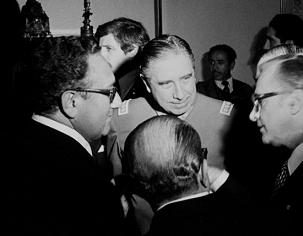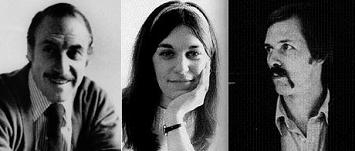New documents link Kissinger, Bush senior to Letelier assassination

Henry Kissinger (left) and Augusto Pinochet (center)
Documents released last week by the National Security Archive, which has played a valuable role in uncovering evidence of the crimes of American imperialism in Latin America, provide new details on the role of top US officials in facilitating the assassination of former Chilean foreign minister Orlando Letelier.
These documents add to the overwhelming case for the prosecution of then-secretary of state Henry Kissinger, then-CIA director George H. W. Bush and other top officials for their role in these and other murders perpetrated by military juntas allied with and backed by the US government.
The September 21, 1976 murder of Letelier and an American aide, Ronni Moffitt, was the most spectacular act of international terrorism on US soil up to that time. The two were killed, and Moffitt’s husband Michael wounded, when a bomb detonated underneath their car as they rounded Sheridan Circle in northwest Washington D.C., barely a mile from the White House.
Letelier, who had served as foreign minister and then defense minister in the reformist government of Salvador Allende, was arrested and tortured in the September 11, 1973 military coup lead by General Augusto Pinochet. He was eventually sent into exile, but became a thorn in the side of the Chilean junta because of his political activities abroad, exposing the savagery of the junta’s repression and campaigning for an international boycott.
Michael Townley, an American citizen working for DINA, the intelligence service of the Chilean military junta, was identified as the manufacturer of the bomb that killed Letelier and Ronni Moffitt. In April 1978, he was extradited from Chile under an agreement that limited his potential sentence and protected the top Chilean and US government officials, who were responsible for ordering the bombing.

Orlando Letelier, Ronni Moffitt and Michael Townley
Townley served only five years of a ten-year term, and then was placed in the federal witness protection program. Some 27 years after his release from prison, the admitted terror-bomber still enjoys the protection of the US government—and in its service, he may well continue to employ his bomb-making skills.
A Chilean Army captain, Armando Fernandez Larios, and three anti-Castro Cuban exiles, Alvin Ross Diaz, Guillermo Novo Sampoll and his brother Ignacio Novo Sampoll, were convicted in the same trial. The Cubans had long records of right-wing terrorism, much of it while in the employ of the CIA.
Townley testified at the trial that the assassination was ordered by the head of DINA, Manuel Contreras, who reported only to Pinochet. It was carried out in collaboration with the Coordination of United Revolutionary Organizations (CORU), a Cuban exile group headed by Luis Posada Carriles and Orlando Bosch, who approved the attack and supplied the operatives who actually planted the bomb that Townley built.
The assassination of Letelier was the culmination of a wave of international gangsterism that followed a series of right-wing military coups across Latin America between 1964 and 1976, largely in response to the Cuban Revolution and the upsurge in the working class that followed throughout the region.
With the full backing and encouragement of the US government, and with the CIA in particular playing the leading role, right-wing military regimes were established in Brazil (1964), Bolivia (1971), Ecuador (1972), Uruguay (1973), Chile (1973), Peru (1975), Argentina (1976). This period also saw the US invasion and occupation of the Dominican Republic in 1965.
By 1976, every country in the “southern cone”—Chile, Argentina, Bolivia, Paraguay, Uruguay and Brazil—was under military rule. These dictatorships embarked on a program of extermination of left-wing opponents who were in exile. This program, supported by the Ford administration in the US, Secretary of State Henry Kissinger and CIA Director George H. W. Bush, was known as “Operation Condor.”
The first major assassination came on September 30, 1974, when General Carlos Prats, former Chilean Defense Minister under Allende, and his wife were murdered by a car bomb in Buenos Aires, Argentina. In October 1975, Bernardo Leighton, Allende’s vice president and a leading Christian Democrat, survived an assassination attempt in Rome. Eleven months later came the murder of Letelier on the streets of Washington D.C.
For the past three decades, despite mounting evidence to the contrary, Kissinger and Bush have maintained that the US government had no responsibility for the assassination of Letelier. The initial story—backed by selective leaks to friendly publications like the New York Times, the Washington Post, and Newsweek—was that Letelier had probably been killed by “leftist extremists,” or else by “rogue” Chilean operatives acting independently of the Pinochet regime.
In the 1990s, however, with the end of the Chilean junta, some evidence of its past crimes began to emerge. In 1993, Contreras and a second DINA leader, Colonel Pedro Espinosa Bravo, were convicted in a Chilean court of ordering the Letelier killing and sentenced to prison terms of seven and six years, respectively.
Documents and testimony emerged about the role of Contreras as a CIA asset during the critical period following the coup, 1974-77, the years when Operation Condor were set in motion and carried out its bloody work. (One estimate, based on documents uncovered by a Paraguayan judge, is that the mutual slaughter by the dictatorships of each others’ opponents—the juntas circulated death lists to their allies—was responsible for 50,000 deaths, 30,000 “disappearances” and the jailing of 400,000 people).
The documents released on April 10 by the National Security Archive relate to Kissinger’s personal role in the last stages of the preparation of the assassination of Letelier. On August 3, 1976, Kissinger was presented a briefing paper on Operation Condor by State Department aides who objected to the assassination program largely on political and diplomatic grounds. It could prove embarrassing to the United States if its client regimes were found engaged in an international rampage.
The Latin American section of the State Department drafted a demarche, a formal diplomatic note to be sent with Kissinger’s signature to six South American countries, with particular emphasis on Uruguay, Argentina and Chile. According to a memorandum written on August 30, 1976, which was made public decades ago, these regimes were to be told that “assassination of subversives, politicians and prominent figures both within the national borders of certain Southern Cone countries and abroad ... would create a most serious moral and political problem.”
It has also long been known that the rebuke was never actually delivered to any of the regimes involved. Several of the ambassadors objected to the tone and content of the note, concerned that it would alienate the dictators. The US ambassador to Uruguay flatly refused to deliver the message, saying he feared for his life—an indication of the atmosphere that surrounded all these bloodstained regimes.
The new documents reveal, however, that it was Kissinger himself who ordered the note rescinded and thus ended the last effort to hold back Operation Condor. On September 16, 1976, Kissinger sent a cable from Lusaka, Zambia, where he was traveling, to the assistant secretary of state for inter-American affairs, Harry Shlaudeman.
Referring to “memo dated August 30 ‘Operation Condor,’ Secretary declined to approve message to Montevideo and has instructed that no further action be taken on this matter.”
While the cable refers only to Montevideo, the capital of Uruguay, the implication was that all efforts to restrain Operation Condor were to be halted. Four days later, Shlaudeman, while visiting Costa Rica, sent a telegram to his own deputy, William Luers, back at the State Department, confirming, “You can simply instruct the ambassadors to take no further action, noting that there have been no reports in some weeks indicating an intention to activate the Condor scheme.”
A day after this telegram—whose last phrase reads suspiciously like official disinformation—the supposedly inactive “Condor scheme” materialized on the streets of the US capital with the murder of Orlando Letelier and Ronni Moffitt.
According to a statement by Peter Kornbluh of the National Security Archive, “The September 16th cable is the missing piece of the historical puzzle on Kissinger’s role in the action, and inaction, of the U.S. government after learning of Condor assassination plots … We know now what happened: The State Department initiated a timely effort to thwart a ‘Murder Inc.’ in the Southern Cone, and Kissinger, without explanation, aborted it.”
Minutes declassified 25 years later detail a private meeting between Kissinger and Pinochet in Chile on June 8, 1976, just over three months before the murder of Letelier. Pinochet complained to his US visitor about the efforts of human rights groups in the US to cut off American military aid to Chile, twice referring by name to Letelier.
Kissinger told Pinochet, “In the United States, as you know, we are sympathetic with what you are trying to do here. I think that the previous government was headed toward Communism. We wish your government well.”
He told Pinochet that he would be giving a speech on human rights to an upcoming meeting of the Organization of American States, saying that he would have to make some reference to conditions in Chile. “I can do no less without producing a reaction in the US which would lead to legislative restrictions,” he explained. “The speech is not aimed at Chile.”
These documents have the utmost relevance today, when the US government, first under George W. Bush and now under Barack Obama, claims for itself the right to conduct a global version of Operation Condor, assassinating anyone designated by the president of the United States as a supposed “enemy combatant,” including US citizens, regardless of international law.
As the history of Operation Condor makes clear, international gangsterism is nothing new for American imperialism. The technology has changed, as has the political climate within the US ruling elite, which now makes it possible for presidents to declare openly what Nixon, Ford and Kissinger could only carry out in the shadows.
___________________________________________________________________________________
























